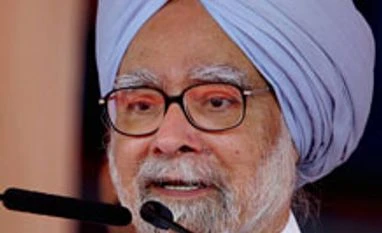Prime Minister Manmohan Singh on Thursday outlined seven principles of engagement to facilitate closer cooperation between India and China, and said both countries should show sensitivity to each other's interests and sovereignty, and move quickly to resolve the boundary issue.
Addressing faculty and students at the Chinese Communist Party's Central Party School in Beijing, Dr. Singh said, "I believe that our two countries not only share a common destiny, but that we have unlimited possibilities for closer cooperation. Let me, therefore, outline seven practical principles of engagement that I believe will set India and China on this course."
In his seven principles of engagement, Dr. Singh called for reaffirming the unwavering commitment to the principles of Panchsheel and conducting the bilateral relationship in a spirit of mutual respect and equal security.
"One, we should reaffirm an unwavering commitment to the principles of Panchsheel and conduct our relationship in a spirit of mutual respect, sensitivity to each other's interests and sovereignty, and mutual and equal security. India has welcomed President Xi Jinping's concept of a new type of great power relations."
"This is a contemporary development of the Panchsheel or Five Principles of Peaceful Co-existence, elaborated by Prime Minister Nehru and Premier Zhou En Lai in the 1950s. It highlights, in a modern context, the need for creating inter-state relations among major powers, based on mutual trust, sensitivity to each other's core concerns and a commitment to resolve all outstanding issues through peaceful dialogue. We should develop our relations on the basis of these principles," he added.
Dr. Singh said, maintaining peace and tranquility in the India-China border region, has been the cornerstone of the bilateral relationship.
More From This Section
"It is essential for mutual confidence and for the expansion of our relations. We should do nothing to disturb that. Indeed, we can achieve it by adhering to our agreements and utilizing our bilateral mechanisms effectively. At the same time, we should move quickly to resolve our boundary issue," he added.
Thirdly, he said, "We should increase consultations and cooperation on complex issues such as trans-border rivers, and our trade imbalance so as to strengthen our strategic and cooperative partnership."
"Four, we should maintain a high level of strategic communication and consultations, in a spirit of transparency, on our region and our periphery, eliminating misunderstanding between our two countries and building experience of positive cooperation. As the two largest countries in Asia, our strategic consultation and cooperation will enhance peace, stability and security in our region and beyond," he added.
On fifth point, Dr. Singh said, "Our convergence on a broad range of global issues should lead to enhanced policy coordination on regional and global affairs and cooperation in regional and multilateral forums in the political, economic and security domains.
"Six, we should harness the full potential of cooperation in all aspects of our relationship, including in the economic area," he added.
On the seventh principle of engagement, Dr. Singh said, "And finally, we will achieve much greater success in our relations by increasing contacts and familiarity between our people in every walk of life."
"Like a beautiful tangram that emerges from seven different shapes, these seven principles would together create a beautiful tapestry of India-China relations in the years ahead," he said.
"I am pleased that the agreements that we have signed yesterday will help to advance many of these shared principles. As officials who will determine public policy, I hope you will do everything to advance our cooperation and promote India-China relations from your positions of responsibility," he added.
Dr. Singh further concluded by saying that the world is large enough to accommodate the development aspirations of both India and China.
"Before I conclude, let me recall what I have often said that the world is large enough to accommodate the development aspirations of both India and China," he said.
)